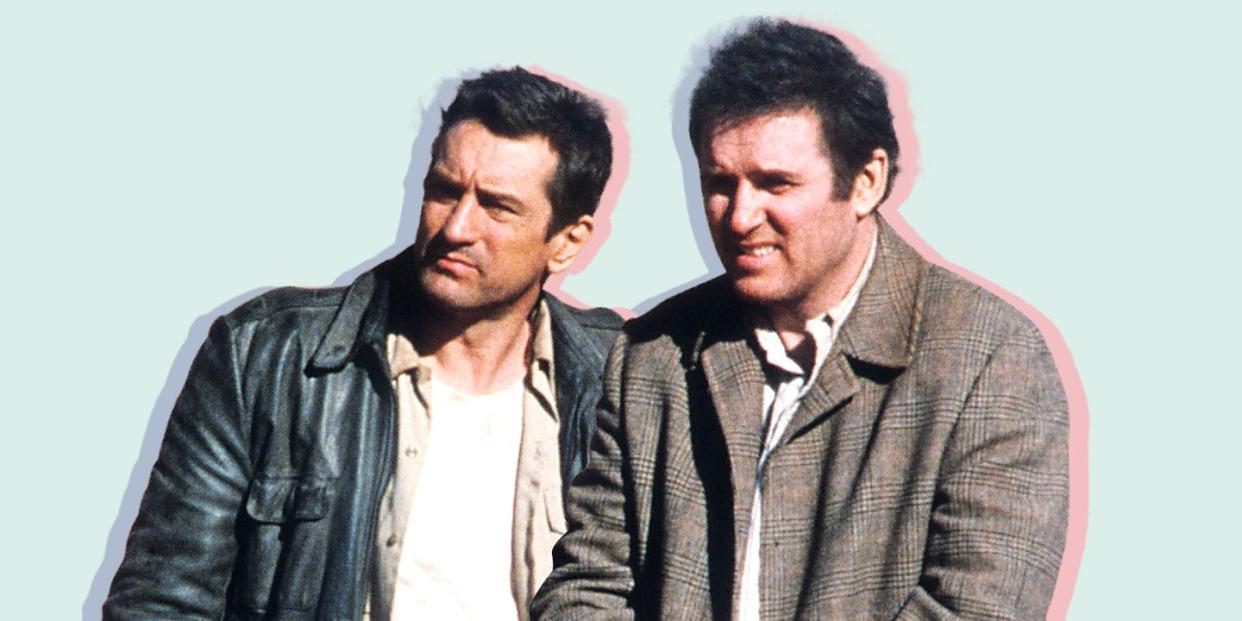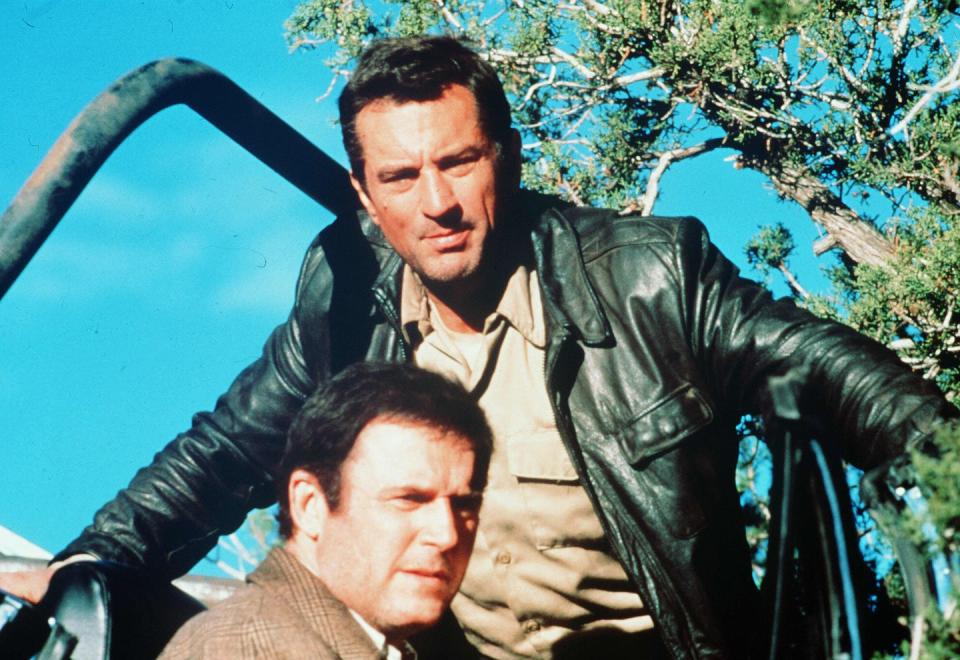32 Years Ago, 'Midnight Run' Became the Best of the Golden Era of Action Buddy Comedies

In the winter of 1982, Nick Nolte and Eddie Murphy’s 48 Hrs. hit theaters. At the time, it seemed like a pretty unlikely marriage of personalities: Nolte, the gruff, rock tumbler-voiced veteran tough-guy who looked like he’d just slept off a week-long bender in an alley somewhere, and Murphy, the ten-thousand-volt 21-year-old breakout star of Saturday Night Live in his film debut.
Paramount, the studio that bankrolled the film, had originally flirted with the idea of teaming Clint Eastwood with Richard Pryor. Which would have been…something. So we can all thank the movie gods for their divine intervention. Because the chemistry that shot like sparks off of Nolte and Murphy turned out to be pure magic. 48 Hrs. would become one of the biggest—and most surprising—box-office hits of the year, giving the SNL star a promising new movie career and Nolte a sorely needed second act to his.
Today, that sort of odd-couple pairing feels so commonplace that it’s become a hack screenwriting cliché. It probably even comes as a default setting in the latest software update of Final Draft. But back in the early ‘80s, it was fairly new. Well, maybe not new exactly, but long dormant. There’d already been movies like Some Like it Hot and Butch Cassidy and the Sundance Kid and Freebie and the Bean. But the commercial success of 48 Hrs. kickstarted a rich, gold-rush era in the genre with subsequent ‘80s flicks such as Tango & Cash, Running Scared, and the Lethal Weapon franchise. And it kept rolling right along into the ‘90s with Bad Boys, Men in Black, and Rush Hour. Hell, even Tommy Boy. This era would come to be known as The Age of the Buddy Action Comedy.
If you weren’t old enough to experience this cycle first hand, I’ll just say this: It was a glorious period. You should have been there. But if you missed it (or just decided to sit it out) and want to belatedly dive in and experience that glory, then allow me to make a possibly controversial suggestion: The place to begin is at the top with what I’m convinced is the Greatest Buddy Action Comedy in an era of Great Buddy Action Comedies, Midnight Run.
Released on this day in 1988, Midnight Run takes the creaky, knee-jerk formula of pairing two mismatched stars with completely different acting styles and pushes it somewhere bizarre, unexpected, hilarious, and ultimately poignant. For those who may not be familiar with this under-appreciated gem, Robert De Niro plays a hard-bitten bounty hunter hired to bring a neurotic Mob accountant who’s embezzled $15 million from the Chicago Mafia (Charles Grodin) from New York to L.A. before he can skip out on his bail bond. He has five days. De Niro’s Jack Walsh is a former Chicago cop who looks at this no-brainer assignment as his last big score—he’s getting $100,000 for the job—so he can open a coffee shop and maybe even work his way back into the life of his teenage daughter. Meanwhile, Grodin’s Jonathan “The Duke” Mardukas is a deadpan loose-cannon who claims that by taking the wiseguys’ money and going on the run he was trying to do the honest thing. Walsh isn’t buying it. Nor does he really even care. All he cares about is getting out of his bum racket.
Since Mardukas is afraid of flying, or at least claims to be (“These things go down! These things go down!”), the short-fused Walsh has to escort the annoying, motormouthed fugitive across the country via stolen cars, lumbering freight trains, and even white-water rapids. The catch is: the trip is getting so tight deadline-wise that Walsh’s twitchy employer (a low-rent bondsman played by the weaselly Joe Pantoliano) sics a rival skip-tracer on them (John Ashton playing a gullible goon to the hilt). Also on their tail are the FBI (led by “Agent Foster Grant”, Yaphet Kotto) and a couple of dim, bent-nose hitmen dispatched by the Windy City’s cream soda-loving Mob boss Jimmy Serrano (Dennis Farina). Is it a lot of balls to keep in the air? Absolutely. But screenwriter George Gallo and director Martin Brest pull it off beautifully.
The path from script to screen on Midnight Run wasn’t a smooth one. Far from it. Brest, who had just made a mint for Paramount with 1984’s Beverly Hills Cop, was slated to make his follow-up for the studio. But Gallo’s script was full of so many spendy action set pieces, that Paramount balked at their $35 million budget. The studio also wasn’t convinced that De Niro was a big enough box-office draw—especially in a comedy. Nor could it agree with Brest on who should play De Niro’s foil as The Duke. Paramount wanted Robin Williams. They even considered switching the gender of the accountant character and casting Cher. But Brest was set on the very un-A-list Grodin, who had blown him away in his audition. With the two parties at an impasse, the project moved across town to Universal.

De Niro, who was just coming off The Untouchables, in which he played a brutal, baseball bat-wielding Al Capone to Kevin Costner’s Eliot Ness, wanted to do something lighter. He even pursued the body-swapping lead role in Penny Marshall’s Big, before Tom Hanks was ultimately cast. Well-trained in improvisational acting (e.g., his unscripted “You talkin’ to me?” monologue in Taxi Driver), he would be energized by Grodin’s shoot-from-the-hip, ad-libbing comic style and also wasn’t put off by Brest’s perfectionist, Kubrickian penchant for doing countless takes. Midnight Run was just the ticket he was looking for. And it remains his greatest onscreen comic achievement. Sorry, Fockers fans. Don’t believe me? Just go back and watch (or re-watch) the film’s “litmus configuration” scene, where a broke Grodin and De Niro pose as FBI agents tracking a counterfeiter. As the cameras roll, De Niro looks like he’s hearing about this scene for the very first time, which is not only perfect for the moment, but also just flat-out great acting.
But Midnight Run is more than just a madcap string of comic detours and switchbacks. It’s also a chance for De Niro to show the soft chewy center that lies beneath his hard-shell exterior. When he and Grodin make a pitstop at the home of his ex-wife and estranged daughter, for a moment the films becomes something more than just a loopy road movie with a series of shootouts and riffs about chorizo and Lyonnaise potatoes. It actually becomes, dare I say, beautiful.
In fact, for about five minutes in its middle act, Midnight Run becomes one of the best male weepies of all-time alongside The Shawshank Redemption and Field of Dreams, thanks not only to De Niro’s awkwardly tender father-daughter reunion (“Are you in the eighth grade?”), but also to the seemingly throw-away symbolism of a broken wristwatch and Grodin’s constant repetition of the question: “Why are you so unpopular with the Chicago Police Department?” De Niro’s assignment, in particular, wasn’t an easy one to to stick the landing on. Especially since his character’s warmest line of dialogue in the first half of the film is: “Here come two words for you: Shut the fuck up!” But stick it, he does.
You’d think that with so many buddy comedies out there, that they’d be simple to make. But they’re actually a high-wire act worthy of the Flying Wallendas. There’s a reason why there are so many bad ones. I love 48 Hrs., Lethal Weapon, and even, yes, Tommy Boy. But Midnight Run belongs in a totally different class in any conversation of Buddy Action Comedies. Why? Mainly, because De Niro and Grodin—as unlikely a duo as you could conjure outside of a game of casting Mad Libs—deliver a masterclass in chemistry.
In a making-of featurette that accompanied the release of the film, Grodin describes the film thusly: “The story basically is a guy chases another guy and a third guy chases the two guys. And then a whole lot of other people chase all of the guys.” He’s not wrong. But, of course, he’s being modest a bit glib. Because Midnight Run is a classic that, more than anything, is really an old-fashioned love story in action-comedy drag. It’s a stealth romantic comedy between two guys who start off hating each other’s guts, but over time, through hardship and misadventure and chorizo and Lyonnaise potatoes, develop a reluctant mutual respect. And even something like…like. Do yourself a favor and check it out tonight. You can thank me later.
You Might Also Like

